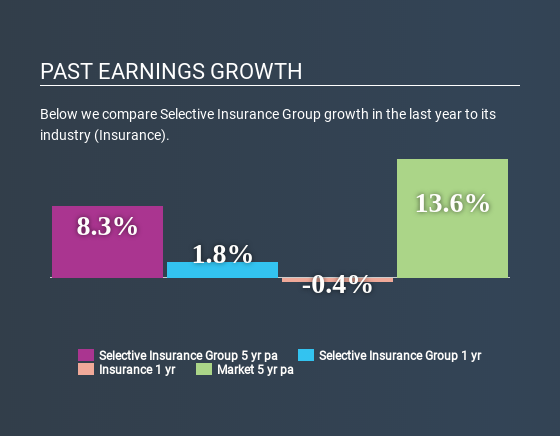- United States
- /
- Insurance
- /
- NasdaqGS:SIGI
Selective Insurance Group, Inc.'s (NASDAQ:SIGI) Fundamentals Look Pretty Strong: Could The Market Be Wrong About The Stock?

With its stock down 13% over the past week, it is easy to disregard Selective Insurance Group (NASDAQ:SIGI). However, a closer look at its sound financials might cause you to think again. Given that fundamentals usually drive long-term market outcomes, the company is worth looking at. Specifically, we decided to study Selective Insurance Group's ROE in this article.
ROE or return on equity is a useful tool to assess how effectively a company can generate returns on the investment it received from its shareholders. In simpler terms, it measures the profitability of a company in relation to shareholder's equity.
See our latest analysis for Selective Insurance Group
How Do You Calculate Return On Equity?
ROE can be calculated by using the formula:
Return on Equity = Net Profit (from continuing operations) ÷ Shareholders' Equity
So, based on the above formula, the ROE for Selective Insurance Group is:
11% = US$226m ÷ US$2.1b (Based on the trailing twelve months to March 2020).
The 'return' is the yearly profit. So, this means that for every $1 of its shareholder's investments, the company generates a profit of $0.11.
Why Is ROE Important For Earnings Growth?
So far, we've learnt that ROE is a measure of a company's profitability. Depending on how much of these profits the company reinvests or "retains", and how effectively it does so, we are then able to assess a company’s earnings growth potential. Generally speaking, other things being equal, firms with a high return on equity and profit retention, have a higher growth rate than firms that don’t share these attributes.
Selective Insurance Group's Earnings Growth And 11% ROE
To start with, Selective Insurance Group's ROE looks acceptable. Further, the company's ROE compares quite favorably to the industry average of 8.9%. This certainly adds some context to Selective Insurance Group's decent 8.3% net income growth seen over the past five years.
We then performed a comparison between Selective Insurance Group's net income growth with the industry, which revealed that the company's growth is similar to the average industry growth of 7.8% in the same period.

Earnings growth is a huge factor in stock valuation. It’s important for an investor to know whether the market has priced in the company's expected earnings growth (or decline). Doing so will help them establish if the stock's future looks promising or ominous. What is SIGI worth today? The intrinsic value infographic in our free research report helps visualize whether SIGI is currently mispriced by the market.
Is Selective Insurance Group Using Its Retained Earnings Effectively?
Selective Insurance Group has a low three-year median payout ratio of 22%, meaning that the company retains the remaining 78% of its profits. This suggests that the management is reinvesting most of the profits to grow the business.
Moreover, Selective Insurance Group is determined to keep sharing its profits with shareholders which we infer from its long history of paying a dividend for at least ten years.
Conclusion
Overall, we are quite pleased with Selective Insurance Group's performance. Particularly, we like that the company is reinvesting heavily into its business, and at a high rate of return. Unsurprisingly, this has led to an impressive earnings growth. With that said, the latest industry analyst forecasts reveal that the company's earnings are expected to accelerate. To know more about the company's future earnings growth forecasts take a look at this free report on analyst forecasts for the company to find out more.
Love or hate this article? Concerned about the content? Get in touch with us directly. Alternatively, email editorial-team@simplywallst.com.
This article by Simply Wall St is general in nature. It does not constitute a recommendation to buy or sell any stock, and does not take account of your objectives, or your financial situation. We aim to bring you long-term focused analysis driven by fundamental data. Note that our analysis may not factor in the latest price-sensitive company announcements or qualitative material. Simply Wall St has no position in any stocks mentioned. Thank you for reading.
About NasdaqGS:SIGI
Selective Insurance Group
Provides insurance products and services in the United States.
Excellent balance sheet established dividend payer.
Similar Companies
Market Insights
Community Narratives


